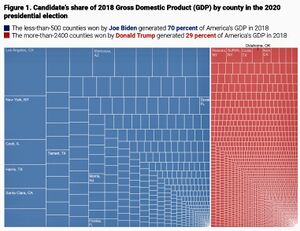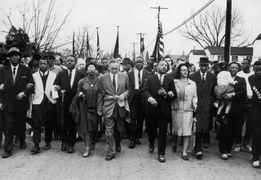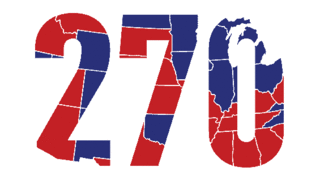Government-US Electoral System-News
Jump to navigation
Jump to search
Curated News Links

Biden-voting counties equal 70% of America’s economy
The Brookings Institute Mark Muro, Eli Byerly Duke, Yang You, and Robert Maxim November 10 2020
A similar analysis for last week’s election shows these trends continuing, albeit with a different political outcome. This time, Biden’s winning base in 477 counties encompasses fully 70% of America’s economic activity, while Trump’s losing base of 2,497 counties represents just 29% of the economy. (Votes are still outstanding in 110 mostly low-output counties, and this piece will be updated as new data is reported.) So, while the election’s winner may have changed, the nation’s economic geography remains rigidly divided. Biden captured virtually all of the counties with the biggest economies in the country (depicted by the largest blue tiles in the nearby graphic), including flipping the few that Clinton did not win in 2016.
By contrast, Trump won thousands of counties in small-town and rural communities with correspondingly tiny economies (depicted by the red tiles). Biden’s counties tended to be far more diverse, educated, and white-collar professional, with their aggregate nonwhite and college-educated shares of the economy running to 35% and 36%, respectively, compared to 16% and 25% in counties that voted for Trump.
The Electoral College’s Racist Origins
For centuries, white votes have gotten undue weight, as a result of innovations such as poll taxes and voter-ID laws and outright violence to discourage racial minorities from voting. (The point was obvious to anyone paying attention: As William F. Buckley argued in his essay “Why the South Must Prevail,” white Americans are “entitled to take such measures as are necessary to prevail, politically and culturally,” anywhere they are outnumbered because they are part of “the advanced race.”) But America’s institutions boosted white political power in less obvious ways, too, and the nation’s oldest structural racial entitlement program is one of its most consequential: the Electoral College.
Of course, the Framers had a number of other reasons to engineer the Electoral College. Fearful that the president might fall victim to a host of civic vices—that he could become susceptible to corruption or cronyism, sow disunity, or exercise overreach—the men sought to constrain executive power consistent with constitutional principles such as federalism and checks and balances. The delegates to the Philadelphia convention had scant conception of the American presidency—the duties, powers, and limits of the office. But they did have a handful of ideas about the method for selecting the chief executive. When the idea of a popular vote was raised, they griped openly that it could result in too much democracy. With few objections, they quickly dispensed with the notion that the people might choose their leader.
But delegates from the slaveholding South had another rationale for opposing the direct election method, and they had no qualms about articulating it: Doing so would be to their disadvantage. Even James Madison, who professed a theoretical commitment to popular democracy, succumbed to the realities of the situation. The future president acknowledged that “the people at large was in his opinion the fittest” to select the chief executive. And yet, in the same breath, he captured the sentiment of the South in the most “diplomatic” terms:
There was one difficulty however of a serious nature attending an immediate choice by the people. The right of suffrage was much more diffusive in the Northern than the Southern States; and the latter could have no influence in the election on the score of the Negroes. The substitution of electors obviated this difficulty and seemed on the whole to be liable to fewest objections.
Which US states make it hardest to vote?
The hardest places to vote in America, considering the strictness of voter identification laws, voter roll purges and felon disenfranchisement.
Is America a democracy? If so, why does it deny millions the vote?
The United States is ranked 57th in electoral integrity in the world. Compared to other liberal democracies, it is ranked second to last.
These copycat bills on Sharia law and terrorism have no effect. So why do states keep passing them?
The use of copy-and-paste legislation – on topics as varied as asbestos liability and used car sales – is the subject of an investigation by USA TODAY, the Center for Public Integrity and The Arizona Republic. USA TODAY and the Republic found that at least 10,000 bills almost entirely copied from model legislation were introduced nationwide in the past eight years, and more than 2,100 of those bills were signed into law. In a separate analysis, the Center for Public Integrity identified tens of thousands of bills with identical phrases, then traced the origins of that language in dozens of those bills across the country.
How to Game the US Electoral System (Electoral College Version)
How to Game the US Electoral System by Kirk Garber 03/2019
The Electoral College has two major weaknesses as an electoral system so I simply calculated the worst case scenario assuming these two weaknesses were taken to their extreme.
1- It incentivizes voter suppression, so if only one person votes in a state, that person's choice receives all of the Electoral College votes. 2 It's formula for deciding how many Electoral Votes are allotted to each state favors small states over large states (by population). So---- if there is only one person from each of the 41 smallest states (including DC) voting and those 41 people all vote for Candidate #2, that candidate would receive 282 Electoral votes, enough to win the Presidency. It wouldn't matter if all the registered voters from the 10 largest states- 81,000,000 (vs 76,600,000 in the 41 smallest states with DC) vote for Candidate #1, their votes are tossed out.


